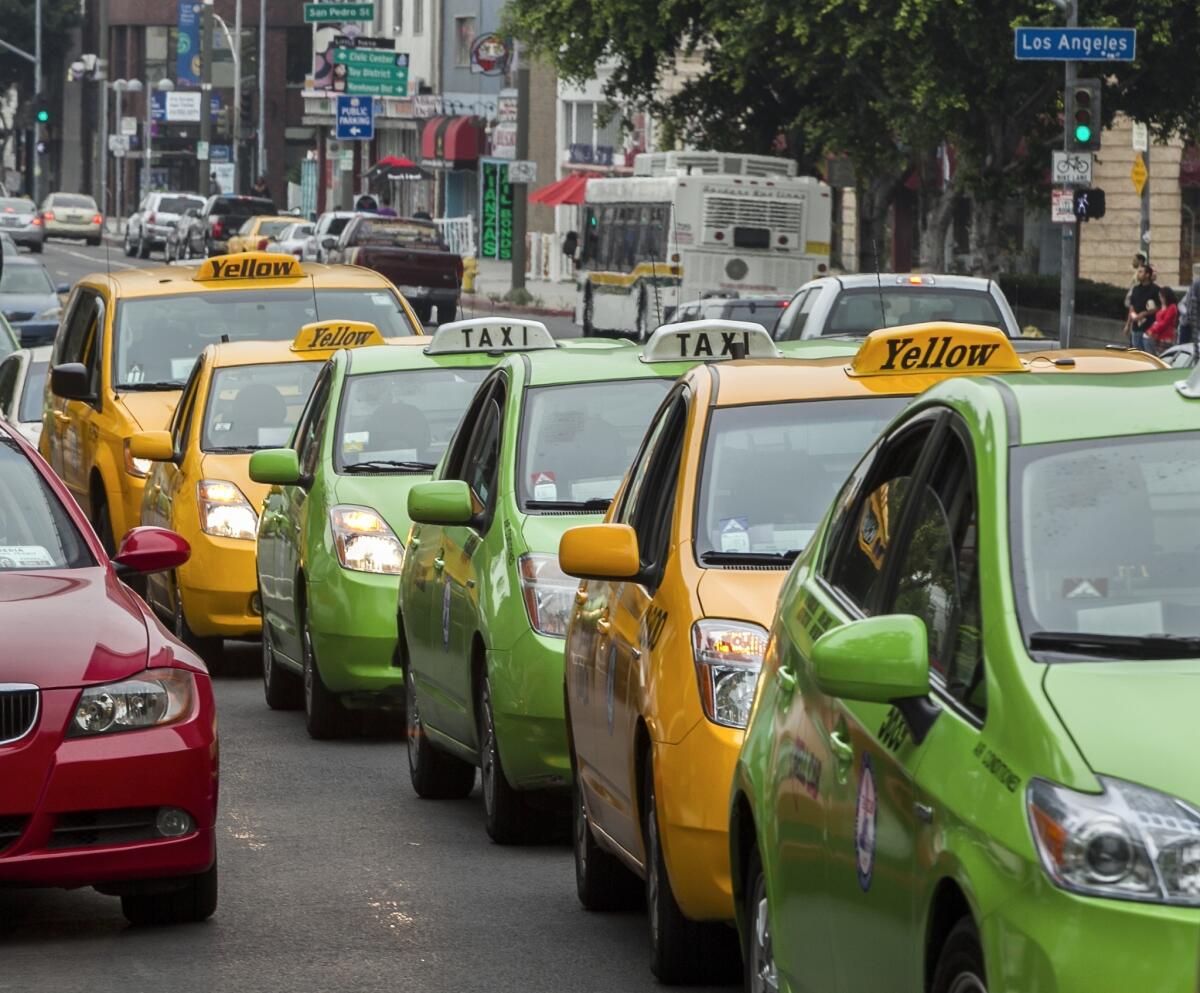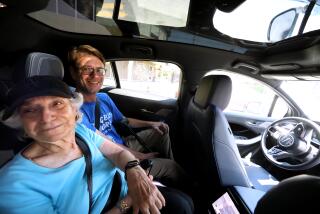L.A., let Uber’s cars share the road

It’s a common experience in cities like Los Angeles. You raise your hand to hail a cab. One goes by. Then another. You contemplate giving up and heading to the closest bus stop or Metro subway station. And you’re left frustrated, thinking that there’s got to be a better way.
Enter Uber. Uber’s mobile app lets consumers arrange for a ride in a Town Car-like vehicle from their phone. Ride-sharing services Lyft and Sidecar operate in similar fashion but use privately owned cars. One plus is that the app allows you to see whether any available cars are nearby and how long it’ll take before one can pick you up. Another is the payment system: Funds are deducted automatically from your pre-linked credit card, so there’s no need to carry a wallet (a receipt is emailed to the customer).
Like many consumers, I love Uber. But not everyone does. Ever since Uber came to California, regulators have seemed determined to send Uber and companies like it on a one-way ride out of the Golden State. For example, the California Public Utilities Commission in November cited Uber for operating without a license, issuing a cease-and-desist notice and a $20,000 fine.
SLIDE SHOW: 10 reasons to salute L.A.’s transportation future
Although the PUC eventually reached an agreement to allow Uber to operate, last month brought another roadblock. The city of Los Angeles ordered the company (along with Lyft and Sidecar) to stop operating. In the last few weeks, four of Uber’s drivers have been arrested in undercover stings to catch “bandit taxicabs.” The city’s cease-and-desist order is premised in part on Uber’s vehicles allegedly lacking the proper permits, disregarding the fact that the PUC has an existing agreement with Uber. Indeed, because Uber functions as a prearranged car service rather than a taxicab service, California law appears to give the PUC, not city officials, the authority to regulate it.
What’s motivating all of this? Simply put, Uber and the other companies are a threat — a threat to entrenched incumbents.
Taxicab companies and others in the transportation industry don’t want a new competitor, especially one that appeals to today’s tech-savvy consumers. The cab industry in Los Angeles has a long history of shutting down competitors, dating to 1914 when it pushed for regulation of rideshare “jitney” cars. And on June 24, more than 200 cabs protested against Uber, Lyft and Sidecar by honking while driving around City Hall.
That’s too bad for all of us. Heavy-handed regulations hurt the very consumers they’re supposed to help. Consumers fare best when the barriers to business entry are low, which helps ensure that the market — any market — becomes competitive and stays that way.
Tech start-ups in other industries face similar burdens. For example, Square has created a credit card reader for mobile devices. Small businesses love Square because it reduces costs and is convenient for customers. But some states want a piece of the action. Illinois, for example, has ordered Square to stop doing business in the Land of Lincoln until it gets a money transmitter license, even though the money flows through existing payment networks when Square processes credit cards. If Square had to get licenses in the 47 states with such laws, it could cost nearly half a million dollars, an extraordinary expense for a fledgling company.
Obstacles to entrepreneurship aren’t limited to the tech world. Across the country, restaurant associations have tried to kick food trucks off the streets. Auto dealers have used franchise laws to prevent car company Tesla from cutting out the middleman and selling directly to customers. Professional boards, too, often fiercely defend the status quo, impeding telemedicine by requiring state-by-state licensing or in-person consultations and even restricting who can sell tooth-whitening services.
These are just the latest chapters in an old economic story. Incumbents have long promoted regulation in the name of protecting consumers when their actual goal is to block new entrants and stifle competition. As Milton Friedman observed, “The pressure on the legislature to license an occupation rarely comes from the members of the public … the pressure invariably comes from members of the occupation itself.”
Consumer protection is important. And rules to ensure safety and to deter fraud are necessary. But many regulations aren’t about safeguarding consumers; they’re about entrenching incumbents (at consumers’ expense), and they’re typically created by the very agencies that are supposed to oversee those incumbents.
Governments at all levels should guard against this tendency by prioritizing innovation and removing unnecessary regulations that burden risk-taking entrepreneurs. If regulators took this approach, we’d make it easier for creative start-ups like Uber, Lyft and Sidecar to be competitive. And we’d leave fewer consumers standing, literally and figuratively, at the curb.
Ajit Pai is a member of the Federal Communications Commission.
More to Read
A cure for the common opinion
Get thought-provoking perspectives with our weekly newsletter.
You may occasionally receive promotional content from the Los Angeles Times.










